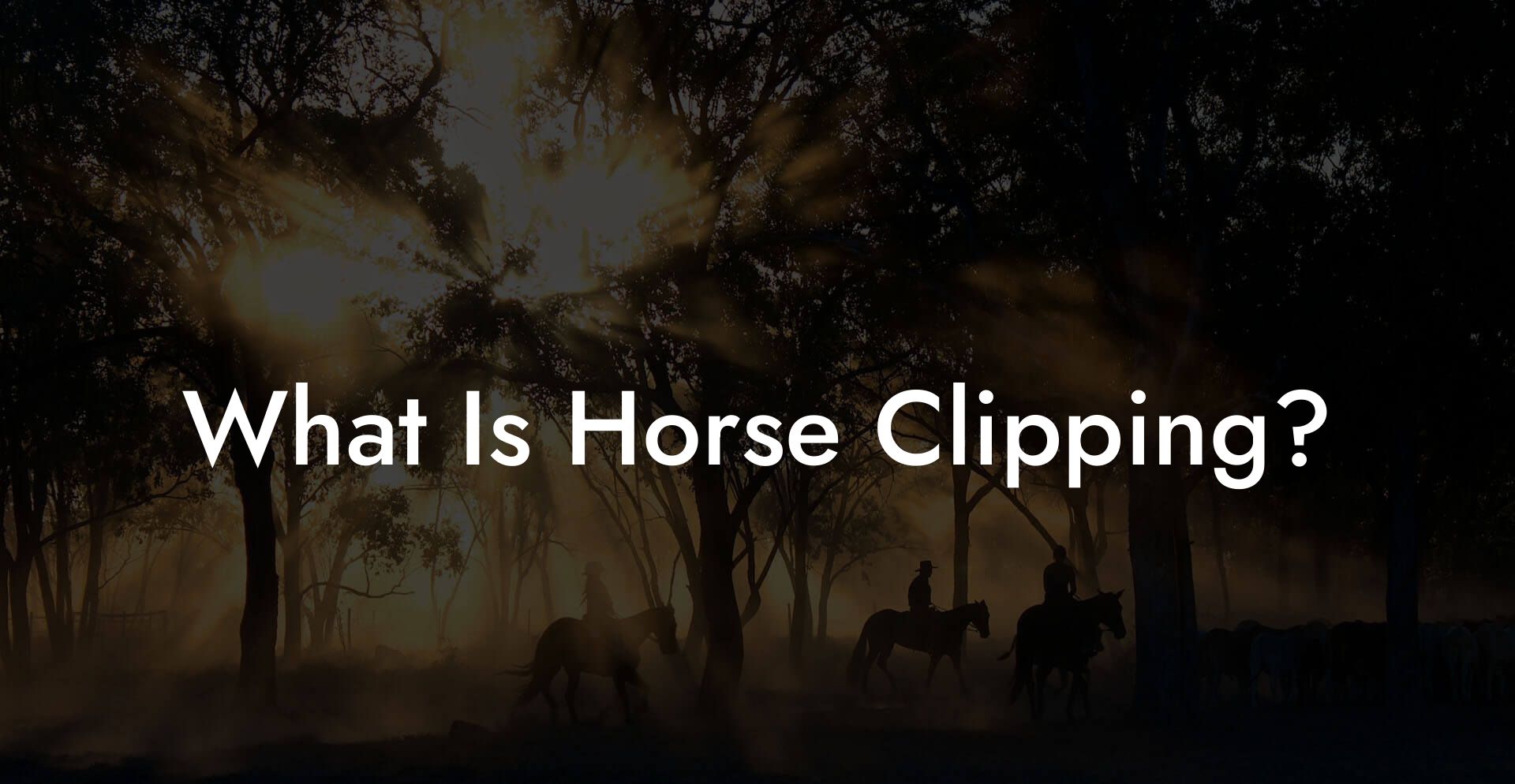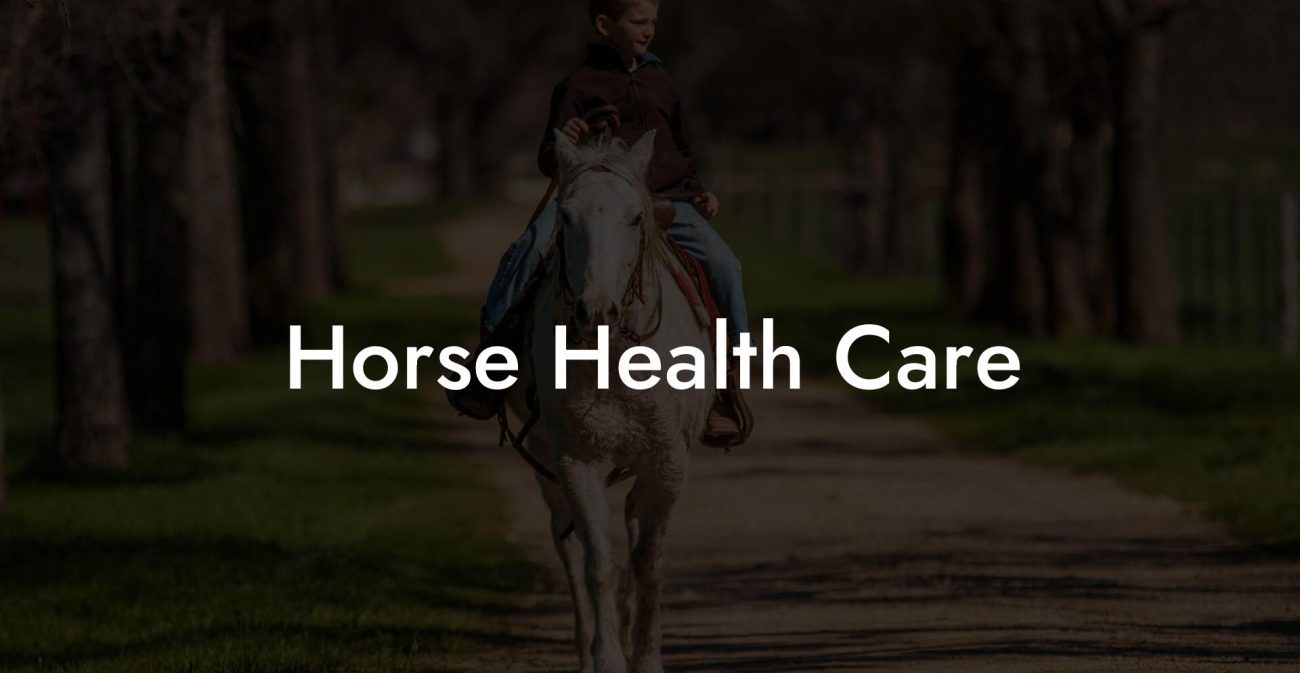Ever wondered what adventures await when you combine a passion for horses with cutting‐edge science? With an equine science degree, the reins are firmly in your hands, whether you're drawn to hands-on horse care, innovative research, or running your own equine-centric business. This comprehensive guide delves into the multifaceted world of equine science, uncovering diverse career paths and opportunities, sharing insider tips, and inspiring you to forge your unique journey in a field where compassion meets expertise.
Quick Links to Useful Sections
- The Allure of an Equine Science Degree
- Exploring Diverse Career Paths in Equine Science
- Equine Management and Business
- Equine Veterinary Support and Animal Health
- Equine Behavior and Training
- Equine Research and Education
- Equine Welfare and Advocacy
- Equine Nutrition and Alternative Therapies
- Navigating the Academic Journey
- Core Curriculum Highlights
- Internships and Field Experience
- Practical Tips for Success in the Equine World
- 1. Embrace Continuous Learning
- 2. Build a Diverse Skill Set
- 3. Network. Network. Network.
- 4. Volunteer and Intern
- 5. Stay Tech-Savvy
- Real-Life Stories: Trailblazers and Trendsetters in Equine Science
- The Visionary Stable Manager
- The Veterinary Researcher with a Twist
- The Trailblazing Advocate for Equine Welfare
- Navigating Specialized Fields Within Equine Science
- Equine Biomechanics and Performance Analysis
- Sports Medicine and Rehabilitation for Horses
- Equine Genetics and Reproductive Technology
- Technology Integration in Equine Care
- Resources and Community Support: Your Next Steps
- Professional Associations and Conferences
- Online Communities and Social Media Groups
- Continuing Education and Certification Programs
- Local Equine Centers and Riding Clubs
- Embracing a Future in Equine Science
- FAQs: Your Equine Science Degree Queries Answered
- Your Journey Into Equine Science Is Just Beginning
The Allure of an Equine Science Degree
The equine industry is booming, and an equine science degree offers so much more than just a pathway to work with horses, it provides an interdisciplinary platform that blends biology, animal behavior, nutrition, health management, and even business skills. Whether you’re driven by the thrill of riding, fascinated by genetics, or inspired to innovate new equine therapies, this degree opens up a stable load of opportunities. In today’s fast-paced world, where the connection between humans and animals is celebrated more than ever by Gen-Z and millennials, equine science stands as an exciting, modern blend of tradition and technological advancement.
As employers look for well-rounded candidates who not only understand equine biology but also appreciate sustainable practices and innovative thinking, graduates find themselves in a unique position to influence everything from reproductive management to equine nutrition and lifestyle trends. With an emphasis on practical skills, research methodologies, and even digital marketing strategies, you’re not just preparing for a job, you’re gearing up to lead initiatives in veterinary care, rehabilitation, performance training, business management, and more.
Imagine a career where your day might involve leading a team at a renowned equine facility one day, and the next, designing innovative nutritional plans or breakthrough research protocols that redefine horse care standards. With an equine science degree, creativity, and scientific rigor share the same pasture, offering a blend of opportunities that cater to diverse interests and strengths.
Exploring Diverse Career Paths in Equine Science
One of the most exciting aspects of an equine science degree is the rich variety of career paths available. Far from a one-size-fits-all approach, this degree caters to those looking to get their hands dirty in stable management, to those inspired by progressive research and equine healthcare.
Equine Management and Business
For the entrepreneurial soul, a career in equine management is a diverse and dynamic field. With courses covering business administration, facility management, and marketing strategies, many graduates venture into managing breeding farms, training centers, or even starting their own equine-related ventures. Modern business practices and digital engagement are key to success, so expect to become well-versed in social media, online branding, and customer experience.
Key Roles: Equine facility manager, stable operations director, equine business consultant, event planner for equine shows.
Equine Veterinary Support and Animal Health
If your passion leans towards animal health, an equine science degree is an ideal springboard into veterinary support and research. Many graduates work closely with veterinarians as veterinary technicians, rehabilitation specialists, and even as part of equine wellness teams in high-performance racing stables. This path also includes areas such as diagnostic imaging, equine nutrition, and biomedical research, where innovative techniques lead the charge in horse care.
Key Roles: Equine veterinary technician, equine rehabilitation specialist, animal health researcher, equine nutrition consultant.
Equine Behavior and Training
Understanding equine psychology and behavior is crucial to both their well-being and performance. With an emphasis on ethology, psychology, and behavior management, an equine science degree can prepare you for a role in training or behavior modification. Whether you’re working on improving horse-human communication, designing training regimens, or even providing behavioral consulting to help address issues like anxiety or aggression in horses, this role is a blend of science and art.
Key Roles: Equine behaviorist, professional trainer, riding instructor, equine performance coach.
Equine Research and Education
For those who are driven by curiosity and the desire to push the boundaries of what we know about horses, academic research and education offer a fulfilling avenue. Many equine science graduates go on to pursue further studies or work in research labs focusing on genetics, reproductive biology, and medicine. Teaching at universities or developing innovative educational programs for future equine professionals also offers rewarding opportunities.
Key Roles: Academic researcher, equine anatomy professor, research coordinator in equine sciences.
Equine Welfare and Advocacy
In a world increasingly focused on ethical animal treatment and sustainable practices, your degree can propel you toward roles in welfare and advocacy. These positions often involve working with nonprofit organizations, animal rights groups, or governmental agencies to improve the standards of care across the industry. Advocates may spearhead initiatives to enhance living conditions, improve rehabilitation protocols for abused horses, or push for policy reforms.
Key Roles: Equine welfare advocate, policy advisor, animal rights campaigner, nonprofit manager.
Equine Nutrition and Alternative Therapies
Feeding the body is as important as feeding the soul. Equine science programs frequently incorporate courses on nutrition, allowing graduates to become experts in dietary planning and alternative therapies. Here, you might work as a nutrition consultant advising on diet plans for racehorses or show horses, or even venture into alternative therapies like acupuncture and hydrotherapy, which are becoming increasingly popular in modern equine care.
Key Roles: Equine nutritionist, alternative therapy specialist, herbal remedy consultant for equine care.
Navigating the Academic Journey
The academic side of equine science is an immersive experience that blends lecture-based learning with hands-on practice. From state-of-the-art research labs to sprawling equestrian centers, your education will equip you with a wealth of knowledge and practical skills. Expect courses in biology, chemistry, genetics, psychology, and physiology alongside specialized classes in horse management, breeding, and behavior.
Core Curriculum Highlights
The core curriculum is designed to build a strong foundation in the sciences. With balanced coursework that integrates theory and application, you’ll grow adept at understanding the complexities of equine physiology, nutrition, and overall management. Among the highlights are:
- Equine Anatomy and Physiology: Detailed study of the horse’s structure and function, fostering a deep understanding of how to detect and address health issues.
- Animal Behavior and Welfare: Courses focused on the emotional and psychological well-being of horses, crucial for developing effective training and rehabilitation techniques.
- Biochemistry and Genetics: Understanding the molecular and genetic blueprints that dictate everything from coat color to performance capabilities.
- Nutritional Science: Insight into formulating balanced diets that enhance performance and address specific health conditions.
- Business and Management: Classes that equip you with the entrepreneurial know-how to run your own stable, training center, or research facility.
In addition to classroom learning, fieldwork and internships play a critical role. Immersive experiences at riding academies, veterinary hospitals, or research centers provide you with real-world exposure and networking opportunities that are invaluable in this competitive field.
Internships and Field Experience
Internships are a cornerstone of the equine science curriculum. They allow you to apply academic learning in practical settings, which is particularly appealing to employers who value hands-on experience as much as a degree. Internships range from working closely with veterinarians in diagnostic labs to managing on-the-ground operations at training centers. These experiences not only enrich your resume but also solidify your practical understanding of horse care, facility management, and research methodologies.
Many programs also offer opportunities to participate in research projects and community outreach initiatives. Whether it’s exploring new rehabilitation protocols or advocating for better welfare practices, these projects can set the stage for groundbreaking discoveries and industry improvements.
Practical Tips for Success in the Equine World
Stepping into the equine industry can be as challenging as it is rewarding. Combining technical knowledge with a genuine love for horses is key to developing a successful career. Here are some tips to help you stand out:
1. Embrace Continuous Learning
The world of equine science is continuously evolving. Stay current with the latest research, industry trends, and emerging technologies. Join professional associations, subscribe to relevant journals, and be active on social media platforms where equine experts share insights. Learn not only from textbooks but also from peers and mentors who have been in the field.
2. Build a Diverse Skill Set
Employers increasingly look for candidates who can wear multiple hats. While technical skills in equine science are crucial, don’t underestimate the power of soft skills like communication, leadership, and digital literacy. Understanding how to market your skills, manage teams, and even navigate online platforms is as valuable as mastering the latest research methods.
3. Network. Network. Network.
In an industry that thrives on relationships, networking is vital. Attend equine conferences, participate in local events, and be active on professional platforms like LinkedIn. Each encounter is a chance to learn, to exchange ideas, and to spark collaborations that could lead to groundbreaking initiatives. Remember: every conversation is a potential stepping stone to your next big opportunity.
4. Volunteer and Intern
Real-world experience is indispensable. Volunteering at equine rescue organizations, stables, and competitions not only builds your resume but also deepens your understanding of horse care and management. These hands-on experiences provide you with the unique insights and empathy needed to deliver excellent equine services.
5. Stay Tech-Savvy
Technology is revolutionizing every aspect of the equine industry. Familiarize yourself with the latest digital tools, from mobile apps that help track horse health to sophisticated data analytics that optimize breeding programs. Being tech-savvy not only sets you apart but also empowers you to make data-driven decisions that enhance outcomes in horse care and management.
By integrating academic excellence with practical experience and modern skills, you’ll be well-prepared to excel in the multifaceted world of equine science.
Real-Life Stories: Trailblazers and Trendsetters in Equine Science
Nothing inspires like real-life success stories. Let’s take a look at some trailblazers who have harnessed their equine science degrees to make a difference.
The Visionary Stable Manager
Meet Sarah, a millennial who transformed her passion for horses and business acumen into a groundbreaking career as a stable manager. After completing her degree, Sarah took on internships at renowned stables and eventually launched her own equine boarding facility. Her secret? Embracing digital marketing, social media engagement, and sustainable practices that resonated with a modern clientele. Today, Sarah’s stable is known for its innovative training programs and emphasis on animal welfare, proving that success in the equine world is about reimagining tradition.
The Veterinary Researcher with a Twist
Then there’s Alex, who combined a love for science with a desire to improve equine health. As an equine science graduate, Alex dove into research focused on regenerative therapies for injured horses. Collaborating with veterinarians and utilizing cutting-edge imaging technologies and biofeedback devices, Alex’s studies have paved the way for innovative treatments that help horses recover faster and with less discomfort. His work has not only improved quality of life for countless equines but has also set a benchmark for industry standards.
The Trailblazing Advocate for Equine Welfare
Elisa’s journey took her from the classroom to the forefront of animal advocacy. Passionate about ethical treatment and education, Elisa now works with nonprofit organizations to shape policies and practices in the equine industry. Her innovative programs train future equine professionals to integrate best care practices while championing animal rights. Elisa’s career is a testament to the idea that with an equine science degree, you can truly be a force for positive change.
These stories illustrate that an equine science degree is not just about horse care, it’s a gateway to impacting lives, pioneering research, and redefining industry standards. With a dash of creativity, a commitment to continuous learning, and a heart for horses, you too can become a leader in this dynamic field.
Navigating Specialized Fields Within Equine Science
As you explore the possibilities, you'll discover that equine science is as diverse as the horses themselves. Beyond traditional career paths, there are specialized fields where you can carve out a niche and become an expert in a focused area.
Equine Biomechanics and Performance Analysis
For those fascinated by movement and performance, equine biomechanics offers a unique blend of science and sport. In this specialization, you'll study the forces and motions involved in a horse’s performance, using advanced technology to analyze gait, stride, and jump mechanics. This field is particularly appealing to individuals interested in improving racing performance, reining techniques, and therapeutic riding programs.
Sports Medicine and Rehabilitation for Horses
Inspired by the growing trend toward wellness in human medicine, equine sports medicine focuses on injury prevention, diagnostics, and rehabilitation. With cutting-edge therapies such as shockwave therapy, physiotherapy, and regenerative medicine, you can become the go-to expert in helping horses recover from injuries and maintain peak performance. This dynamic field combines hands-on care with scientific innovation, ensuring that your work has a direct, positive impact on a horse’s career.
Equine Genetics and Reproductive Technology
The genetic blueprint of a horse holds the key to performance, temperament, and susceptibility to certain health issues. Specializing in equine genetics puts you at the forefront of innovation, where you'll explore genetic testing, genome mapping, and reproductive technologies. This field not only enhances animal breeding programs but also helps preserve rare and heritage breeds.
Technology Integration in Equine Care
The digital revolution is transforming every industry, and equine science is no exception. From wearable health monitors and tracking systems to sophisticated data analytics platforms, technology is redefining horse management. Specialists in this field merge expertise in computer science with equine studies to create solutions that predict health issues, optimize training regimens, and enhance overall care protocols.
Venturing into a specialized field within equine science can not only satisfy your intellectual curiosity but also position you as a leader in an emerging niche. By collaborating with experts across disciplines and staying up-to-date with technological advances, you’ll be perfectly poised to contribute to, and benefit from, this rapidly evolving industry.
Resources and Community Support: Your Next Steps
Embarking on a career in equine science is as much about building a community as it is about academic achievement. The equine industry is rich with resources, professional networks, and opportunities for ongoing learning. Here are some key resources and communities that can help you navigate your journey:
Professional Associations and Conferences
Joining associations such as the American Association of Equine Practitioners (AAEP), the Equine Science Society, or international organizations can open doors to invaluable networking opportunities. Conferences, seminars, and workshops conducted by these bodies offer the chance to stay abreast of the latest research, technological trends, and best practices in horse care.
Online Communities and Social Media Groups
In today’s digital age, online platforms are a powerhouse for connection. Forums, Facebook groups, Reddit communities, and LinkedIn networks dedicated to equine professionals bring together enthusiasts, researchers, and experts. These platforms provide real-time advice, mentorship opportunities, and updates on industry news, making them essential for both beginners and seasoned professionals.
Continuing Education and Certification Programs
Lifelong learning is a staple in a rapidly evolving field such as equine science. Consider enrolling in certifications for equine nutrition, rehabilitation, or behavior modification. Many universities and professional organizations offer short courses and online programs that allow you to sharpen your skills or specialize in a particular area.
Local Equine Centers and Riding Clubs
Often, the most hands-on advice comes from community-based organizations. Equine centers and riding clubs not only offer practical experience but also a supportive environment where you can learn from experienced trainers, veterinarians, and farm managers.
No matter what your career goals are, leveraging these resources can provide you with the latest industry insights, the latest techniques in equine care, and a network of like-minded professionals ready to support you on every step of your journey.
Embracing a Future in Equine Science
A degree in equine science is a versatile ticket to a world filled with opportunities. Whether you are passionate about direct horse care, aspire to lead groundbreaking research initiatives, or dream of managing your own equine facility, this dynamic field offers you the perfect arena to combine science, empathy, and strategic vision.
As you navigate the myriad possibilities, from equine management and veterinary support to research, advocacy, and technological innovation, remember that your journey is uniquely yours. Every internship, every networking event, and every hands-on experience contributes to a skill set that not only enhances your resume but also enriches your understanding of these majestic animals.
With the increasing attention to sustainability and ethical practices among Gen-Z and millennial professionals, the equine science arena is rapidly evolving. There’s never been a better time to develop your expertise and make an impact. Embrace innovative practices, build strong relationships in the community, and continuously look for ways to push the boundaries of traditional horse care.
The future of equine science is as dynamic as the horses it serves, blending tradition with innovation, heart with science. Whether you opt for research-driven roles, management positions, or grassroots advocacy, the keys to success lie in passion, perseverance, continuous learning, and the willingness to adapt to an ever-changing landscape.
FAQs: Your Equine Science Degree Queries Answered
Curious minds always have questions. Below are some of the most frequently asked questions about pursuing an equine science degree, along with answers that illuminate the journey ahead.
1. What exactly is an equine science degree?
An equine science degree is an interdisciplinary program that combines animal biology, behavior, nutrition, management, and business. It equips students with a comprehensive understanding of horse care, equine research, and operational aspects of equine-related industries.
2. What career paths can I pursue with an equine science degree?
Graduates can venture into diverse fields including equine management, veterinary support, behavior and training, research, welfare advocacy, nutrition, and specialized areas like equine biomechanics or sports medicine.
3. Is it possible to start my own equine business with this degree?
Absolutely! Many programs include business and management courses that prepare you to launch and manage your own equine ventures, from boarding facilities to training centers.
4. How important is hands-on experience during the program?
Extremely important. Internships, fieldwork, and volunteer opportunities offer real-world experience that can be a game-changer for your career, helping you apply your academic knowledge in practical settings.
5. Are there opportunities for further specialization?
Yes. Graduates can specialize in areas such as equine genetics, sports medicine, alternative therapies, or technology integration, often through additional certifications or postgraduate studies.
6. How does an equine science degree help in promoting animal welfare?
The interdisciplinary curriculum emphasizes ethical practices, animal behavior, and welfare standards, enabling graduates to advocate for and implement improved care strategies in various equine settings.
7. What is the job outlook for equine science graduates?
The job outlook is promising, with venues in veterinary support, management, research, and advocacy expanding as the equine industry grows and evolves.
8. Can I study equine science online?
Many institutions offer hybrid or online components for certain coursework, although practical, hands-on experiences remain a crucial part of the learning journey.
9. What skills will I develop during the course?
Alongside a deep understanding of equine biology and care, you’ll develop skills in research, data analysis, business management, communication, and even technological literacy, making you well-equipped for the modern workplace.
10. Who is the ideal candidate for an equine science degree?
If you have a passion for horses, a curiosity for science and innovation, and a desire to effect positive change in the equine world, then this degree is perfect for you.
Your Journey Into Equine Science Is Just Beginning
Now that you’re armed with the inside scoop on the boundless opportunities an equine science degree has to offer, it’s time to embrace your path. The future is brimming with possibilities, from transforming equine nutrition and health care strategies to pioneering innovative research and weaving technology seamlessly into everyday horse management. The equine industry thrives on passion, creativity, and resilience, and with your degree, you’re perfectly poised to shape its future.
Remember, every innovative trainer, diligent researcher, or visionary manager started with a single step, a commitment to learning, a willingness to get your hands dirty, and the passion to make a difference. By combining state-of-the-art science with genuine care for horses, you have the potential to redefine what it means to be an equine professional.
So, whether you dream of leading cutting-edge research, running a state-of-the-art equine facility, advocating for better animal welfare practices, or simply elevating the standard of horse care, your journey in equine science can be as diverse and dynamic as the industry itself.
Take this guide as your starting point, a roadmap to navigate the myriad opportunities at your fingertips. Embrace every challenge, learn continuously from every opportunity, and let your passion for horses guide you toward a fulfilling, impactful career in equine science. The reins are in your hands, saddle up, and ride toward a future full of promise and discovery.













